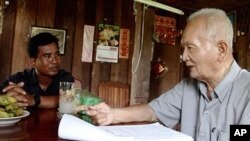The International Center for Journalists will award Cambodian journalist and filmmaker Thet Sambath for his reporting on Khmer Rouge leader Nuon Chea.
Thet Sambath spent more than a decade in extensive interviews with Brother No. 2 before his arrest and detention at the UN-backed tribunal. That reporting went into the making of “Enemies of the People,” an award-winning documentary co-produced with British documentarian Rob Lemkin.
In an announcement in Washington last week, the center said it would award its 2011 Knight International Journalism Award to Thet Sambath in a ceremony later this year.
Also receiving the award were journalists Rocío Idalia Gallegos Rodríguez and Sandra Rodríguez Nieto, for their coverage of the Mexican drug war in the dangerous border town of Ciudad Juarez.
The prize jury awarded Thet Sambath for his work as “one of the most outstanding journalists we had seen in a long time,” Joyce Bernathan, the president of the International Center for Journalists, told VOA Khmer after announcing the winners. “The jury felt that not only is he a great, investigative journalist, but this is a major contribution to understanding a very, very tragic period of world history.”
The winners had been winnowed down from 160 nominations, she said, in submissions from professional and citizen journalists alike. “So it is a very competitive process,” she said.
Thet Sambath, a senior reporter at the Phnom Penh Post, told VOA Khmer by phone he was surprised to have won.
“I didn’t expect I could win such an honorable award, because I’m not a journalist who graduated from a well-know journalism school,” he said. “I learned by working, and I tried to write my reports as best I could.”
Diane Hodges, former journalist based in Thailand, said she understood the difficulties getting former Khmer Rouge to talk. In the early 1990s, she had sought to interview Pol Pot.
“We were in the car, and we went to eastern Thailand where we heard Pol Pot was staying,” she said. “When we got close to the area, there were Thai soldiers there. And they wouldn’t let us go any further. They said it was a protected area. They went through all our IDs and we hadn’t any kind of permit, so they turned us back. They wouldn’t let us go in.”
The producers now plan to start selling DVDs of the film, which not only follows Thet Sambath’s quest to learn more about Nuon Chea and the Khmer Rouge, but also highlights the lives of low-ranking cadre who killed fellow Cambodians.
Lemkin said on the film’s website Thet Sambath had developed a skill to work with Khmer Rouge sources. “His patience is extraordinary,” Lemkin wrote. “The perpetrators of the Khmer Rouge Killing Fields have spoken and are speaking to him because they trust him and because he has persuaded them at the most profound level that it is in their interests and those of their society to speak – no matter how difficult or dangerous it may be for them. This is an astounding achievement.”




